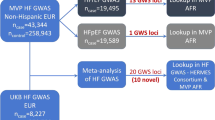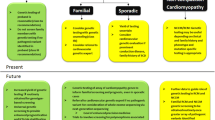Abstract
Heart failure is a heterogeneous disease, the development and pathophysiology of which involves complex interactions between genetic and environmental factors. It is well known that there are several heritable forms of heart failure in which genetic variation makes an individual more likely to develop the disease; however, less is clear about the degree to which genetics plays a role in the pathogenesis of more classic forms of heart failure. Several studies have been performed in patients with heart failure to determine the influence of modifier genes on exercise capacity, cardiovascular and pulmonary function, and outcomes, including survival. Given the variability in the response to pharmacologic treatment in patients with heart failure, there is an emerging interest in the optimal pharmacologic intervention for a given genotype in patients with heart failure. This review focuses primarily on several modifier genes, principally those associated with regulation of the adrenergic and rennin-angiotensinaldosterone systems and those important to vascular control in heart failure, as well as the impact of these genes in the response to treatment.
Similar content being viewed by others
References and Recommended Reading
Butler J, Hanumanthu S, Chomsky D, et al.: Frequency of low-risk hospital admissions for heart failure. Am J Cardiol 1998, 81:41–44.
O’Connell JB, Bristow MR: Economic impact of heart failure in the United States: time for a different approach. J Heart Lung Transplant 1994, 13:S107–S112.
Song L, DePalma SR, Kharlap M, et al.: Novel locus for an inherited cardiomyopathy maps to chromosome 7. Circulation 2006, 113:2186–2192.
Tsoutsman T, Lam L, Semsarian C: Genes, calcium and modifying factors in hypertrophic cardiomyopathy. Clin Exp Pharmacol Physiol 2006, 33:139–145.
Grunig E, Tasman JA, Kucherer H, et al.: Frequency and phenotypes of familial dilated cardiomyopathy. J Am Coll Cardiol 1998, 31:186–194.
Marian AJ, Roberts R: The molecular genetic basis for hypertrophic cardiomyopathy. J Mol Cell Cardiol 2001, 33:655–670.
Marian AJ, Roberts R: Molecular genetic basis of hypertrophic cardiomyopathy: genetic markers for sudden cardiac death. J Cardiovasc Electrophysiol 1998, 9:88–99.
Liggett SB, Mialet-Perez J, Thaneemit-Chen S, et al.: A polymorphism within a conserved beta(1)-adrenergic receptor motif alters cardiac function and beta-blocker response in human heart failure. Proc Natl Acad Sci U S A 2006, 103:11288–11293.
Small KM, Wagoner LE, Levin AM, et al.: Synergistic polymorphisms of beta1-and alpha2C-adrenergic receptors and the risk of congestive heart failure. N Engl J Med 2002, 347:1135–1142.
Pilbrow AP, Palmer BR, Frampton CM, et al.: Angiotensinogen M235T and T174M gene polymorphisms in combination doubles the risk of mortality in heart failure. Hypertension 2007, 49:322–327.
Schelleman H, Klungel OH, Witteman JC, et al.: Angiotensinogen M235T polymorphism and the risk of myocardial infarction and stroke among hypertensive patients on ACE-inhibitors or beta-blockers. Eur J Hum Genet 2007, 15:478–484.
Caulfield M, Lavender P, Farrall M, et al.: Linkage of the angiotensinogen gene to essential hypertension. N Engl J Med 1994, 330:1629–1633.
Jeunemaitre X, Soubrier F, Kotelevtsev YV, et al.: Molecular basis of human hypertension: role of angiotensinogen. Cell 1992, 71:169–180.
Tang W, Devereux RB, Rao DC, et al.: Associations between angiotensinogen gene variants and left ventricular mass and function in the HyperGEN study. Am Heart J 2002, 143:854–860.
Nemer M, Dali-Youcef N, Wang H, et al.: Mechanisms of angiotensin II-dependent progression to heart failure. Novartis Found Symp 2006, 274:58–72, 152–155, 272–276.
Pilati M, Cicoira M, Zanolla L, et al.: The role of angiotensinconverting enzyme polymorphism in congestive heart failure. Congest Heart Fail 2004, 10:87–95.
Cascorbi I, Paul M, Kroemer HK: Pharmacogenomics of heart failure—focus on drug disposition and action. Cardiovasc Res 2004, 64:32–39.
Ulgen MS, Ozturk O, Alan S, et al.: The relationship between angiotensin-converting enzyme (insertion/deletion) gene polymorphism and left ventricular remodeling in acute myocardial infarction. Coron Artery Dis 2007, 18:153–157.
Donahue MP, Marchuk DA, Rockman HA: Redefining heart failure: the utility of genomics. J Am Coll Cardiol 2006, 48:1289–1298.
Abraham MR, Olson LJ, Joyner MJ, et al.: Angiotensin-converting enzyme genotype modulates pulmonary function and exercise capacity in treated patients with congestive stable heart failure. Circulation 2002, 106:1794–1799.
Schunkert H: Polymorphism of the angiotensin-converting enzyme gene and cardiovascular disease. J Mol Med 1997, 75:867–875.
Hindorff LA, Heckbert SR, Tracy R, et al.: Angiotensin II type 1 receptor polymorphisms in the cardiovascular health study: relation to blood pressure, ethnicity, and cardiovascular events. Am J Hypertens 2002, 15:1050–1056.
Brodde OE: Beta 1-and beta 2-adrenoceptors in the human heart: properties, function, and alterations in chronic heart failure. Pharmacol Rev 1991, 43:203–242.
Brodde OE, Bruck H, Leineweber K, et al.: Presence, distribution and physiological function of adrenergic and muscarinic receptor subtypes in the human heart. Basic Res Cardiol 2001, 96:528–538.
Liew CC, Dzau VJ: Molecular genetics and genomics of heart failure. Nat Rev Genet 2004, 5:811–825.
Tevaearai HT, Eckhart AD, Walton GB, et al.: Myocardial gene transfer and overexpression of beta2-adrenergic receptors potentiates the functional recovery of unloaded failing hearts. Circulation 2002, 106:124–129.
Ahmet I, Krawczyk M, Heller P, et al.: Beneficial effects of chronic pharmacological manipulation of beta-adrenoreceptor subtype signaling in rodent dilated ischemic cardiomyopathy. Circulation 2004, 110:1083–1090.
White HL, de Boer RA, Maqbool A, et al.: An evaluation of the beta-1 adrenergic receptor Arg389Gly polymorphism in individuals with heart failure: a MERIT-HF sub-study. Eur J Heart Fail 2003, 5:463–468.
Liggett SB, Wagoner LE, Craft LL, et al.: The Ile 164 beta2-adrenergic receptor polymorphism adversely affects the outcome of congestive heart failure. J Clin Invest 1998, 102:1534–1539.
Eisenach JH, Barnes SA, Pike TL, et al.: Arg16/Gly beta2-adrenergic receptor polymorphism alters the cardiac output response to isometric exercise. J Appl Physiol 2005, 99:1776–1781.
Dishy V, Sofowora GG, Xie HG, et al.: The effect of common polymorphisms of the beta2-adrenergic receptor on agonist-mediated vascular desensitization. N Engl J Med 2001, 345:1030–1035.
Garovic VD, Joyner MJ, Dietz NM, et al.: Beta(2)-adrenergic receptor polymorphism and nitric oxide-dependent forearm blood flow responses to isoproterenol in humans. J Physiol 2003, 546:583–589.
Cockcroft JR, Gazis AG, Cross DJ, et al.: Beta(2)-adrenoceptor polymorphism determines vascular reactivity in humans. Hypertension 2000, 36:371–375.
Snyder EM, Beck KC, Dietz NM, et al.: Arg16Gly polymorphism of the ta2-adrenergic receptor is associated with differences in cardiovascular function at rest and during exercise in humans. J Physiol 2006, 571:121–130.
Snyder EM, Hulsebus ML, Turner ST, et al.: Genotype related differences in beta2 adrenergic receptor density and cardiac function. Med Sci Sports Exerc 2006, 38:882–886.
Snyder EM, Turner ST, Joyner MJ, et al.: The Arg16Gly polymorphism of the ta2-adrenergic receptor and the natriuretic response to rapid saline infusion in humans. J Physiol 2006, 574:947–954.
Shin J, Lobmeyer MT, Gong Y, et al.: Relation of beta(2)-adrenoceptor haplotype to risk of death and heart transplantation in patients with heart failure. Am J Cardiol 2007, 99:250–255.
Wolk R, Snyder EM, Somers VK, et al.: Arginine 16 glycine beta2-adrenoceptor polymorphism and cardiovascular structure and function in patients with heart failure. J Am Soc Echocardiogr 2007, 20:290–297.
Snyder EM, Turner ST, Johnson BD: ta2-Adrenergic receptor genotype and pulmonary function in patients with heart failure. Chest 2006, 130:1527–1534.
Agostoni P, Marenzi G, Lauri G, et al.: Sustained improvement in functional capacity after removal of body fluid with isolated ultrafiltration in chronic insufficiency: failure of furosemide to provide the same result. Am J Med 1994, 96:191–199.
Snyder EM, Beck KC, Turner ST, et al.: Genetic variation of the ta2 adrenergic receptor is associated with differences in lung fluid accumulation in humans. J Appl Physiol 2007, 102:2172–2178.
Kammerer S, Braun A, Arnold N, et al.: The human bradykinin B2 receptor gene: full length cDNA, genomic organization and identification of the regulatory region. Biochem Biophys Res Commun 1995, 211:226–233.
Olson TP, Snyder EM, Frantz RP, et al.: Repeat length polymorphism of the serotonin transporter gene influences pulmonary artery pressure in heart failure. Am Heart J 2007, 153:426–432.
Pretorius MM, Gainer JV, Van Guilder GP, et al.: The bradykinin type 2 receptor BE1 polymorphism and ethnicity influence systolic blood pressure and vascular resistance. Clin Pharmacol Ther 2007, [Epub ahead of print].
Olson TP, Snyder EM, Frantz RP, et al.: Gene variant of the bradykinin B2 receptor influences pulmonary arterial pressures in heart failure patients. J Card Fail 2006, 12:S44.
Lanfear DE, Stolker JM, Marsh S, et al.: Genetic variation in the B-type natiuretic peptide pathway affects BNP levels. Cardiovasc Drugs Ther 2007, 21:55–62.
Pitzalis MV, Sarzani R, Dessi-Fulgheri P, et al.: Allelic variants of natriuretic peptide receptor genes are associated with family history of hypertension and cardiovascular phenotype. J Hypertens 2003, 21:1491–1496.
McNamara DM, Holubkov R, Postava L, et al.: Pharmacogenetic interactions between angiotensin-converting enzyme inhibitor therapy and the angiotensin-converting enzyme deletion polymorphism in patients with congestive heart failure. J Am Coll Cardiol 2004, 44:2019–2026.
de Groote P, Helbecque N, Lamblin N, et al.: Beta-adrenergic receptor blockade and the angiotensin-converting enzyme deletion polymorphism in patients with chronic heart failure. Eur J Heart Fail 2004, 6:17–21.
Lanfear DE, Jones PG, Marsh S, et al.: Beta2-adrenergic receptor genotype and survival among patients receiving beta-blocker therapy after an acute coronary syndrome. JAMA 2005, 294:1526–1533.
Author information
Authors and Affiliations
Corresponding author
Rights and permissions
About this article
Cite this article
Snyder, E.M., Olson, T.P. & Johnson, B.D. Genetics and pharmacogenetics in heart failure. Curr Heart Fail Rep 4, 139–144 (2007). https://doi.org/10.1007/s11897-007-0032-3
Published:
Issue Date:
DOI: https://doi.org/10.1007/s11897-007-0032-3




